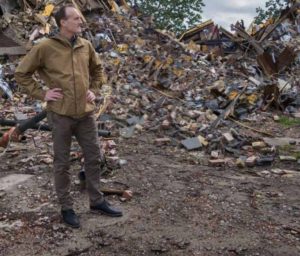Pritzker Hageman Explosion Lawyer Calls on Pipeline Industry To Intensify Safety Warnings
Natural gas leaked from a damaged, underground gas main into a single-family home in a Dallas neighborhood. The five people inside the structure were 100 percent unaware of the hazard even though the pipeline company had been investigating leaks in the neighborhood in the previous 48 hours.
Covered up by the company’s silence, the leak continued and the gas accumulated. At 6:30 a.m. on Feb. 23, 2018, the house at 3534 Espanola Drive exploded. Killed in the fiery blast was 12-year-old Linda “Michellita” Rogers. Burns and other injuries were suffered by four others. Only then did pipeline owner Atmos Energy notify the public about the danger, investigators at the National Transportation Safety Board (NTSB) revealed. To guard against more explosion deaths and injuries, the company finally shut off the gas service and called for residents to evacuate. The NTSB discovered that Atmos crews were investigating and repairing leaks directly behind the house the night before the blast.
“Atmos did not take appropriate action to secure the safety of the area and its residents,’’ the NTSB said in its final report. “Contributing to the severity of the explosion was… the corporation’s inaction to isolate the affected main and evacuate the houses.’’
Contact Our Burn Injury Lawyers About Your Case
Call Us: 888-377-8900
Text Us: 612-261-0856
Pipeline Accident Lawyer Calls for Increased Transparency
Attorney Eric Hageman, a pipeline accident lawyer at the national explosion law firm Pritzker Hageman, said the explosion death in Dallas – coupled with similar cases elsewhere in the industry – provides proof that America needs public notification requirements to protect citizens. As soon as threats arise, companies should be obligated to urgently notify the people who are in potential danger. It’s a responsibility borne from the inherent danger of pumping natural gas, liquid propane, and other petroleum-based fuels through pipelines covered only by topsoil. Across the United States, the pipeline network serves 76 million homes and workplaces.
“It’s so fundamentally wrong that people don’t know what dangers are underground,’’ Hageman said. “How often is it the case that companies withhold news of a leaking pipeline until it’s too late?’’
Hageman said it’s time to obligate the industry to immediately broadcast information about suspected gas leaks, pipeline cracks, or corrosion concerns. Likewise, companies should be required by law to notify the public when any crew is going to dig near a pipeline or when pipeline repairs are about to happen. Yet another risk that should trigger wide public notification is when companies increase pressure inside a gas pipeline.
“It absolutely makes sense that people should be able to make decisions about their own safety,’’ Hageman said. “Some people would probably want to clear out when someone’s working on a gas line near their home. You should have the right to protect yourself.’’

Pipeline accident lawyer Eric Hageman investigates the site of a gas explosion in Minnesota.
As an explosion injury lawyer, Hageman successfully represented the family of a school employee in Minneapolis who was killed in a natural gas explosion. A crew was making new pipeline connections at the school when a mistake caused a high-pressure leak. The workers ran away to safety without warning others. The explosion leveled the private school and killed two of its beloved, longtime employees.
Hageman’s recoveries for clients include a $45 million settlement for a young father who was horrifically burned in a pipeline explosion in 2016. Like most natural gas explosion survivors, the clients weren’t even aware that their neighborhood was laced with underground natural gas lines.
A Pennsylvania pipeline is similarly getting public attention in the Rose Tree Media School District. Families are asking tough questions about why the school district is planning to build a new learning center steps away from the same gas line – especially given its history of failure. Pipeline Safety Trust executive director Bill Caram told a local television station that parents have reason to be concerned.“I am surprised that a new school would be built so close to a gas transmission line because we all want to keep our kids safe and the lines do pose a risk,” Caram said.
Even when industry officials mark the location of buried pipelines, digging crews have been known to rupture the lines by accident. Neighborhoods, including schools, churches, and businesses, have the right to know when such risks are introduced.
Companies needing to excavate in a populated area are required by law to notify Underground Service Alert (USA aka Dig Alert). Dig Alert then notifies nearby subscribers, but subscribers are generally the utility companies that go to the site to mark the location of their underground pipelines. School districts can join for a nominal fee, but Hageman said this is a far cry from public notification.
Pipeline Explosion Accountability
The explosion death in Texas of Michellita Rogers prompted discussions about possible notification reforms, but there have been no major breakthroughs. From state to state, notification requirements vary dramatically when it comes to digging and repairs. Moreover, it doesn’t appear that any states have at-large public notification requirements when it comes to active pipeline hazards. Instead, we allow big energy companies to investigate gas leaks in residential neighborhoods and elsewhere without demanding precautionary safety announcements.
In the Rogers case, the family settled a wrongful death lawsuit in May 2019 for an amount of money that was not made public. Their natural gas explosion lawsuit sought damages of at least $1 million. Wrongful death lawsuits and burn lawsuits hold wrongdoers accountable when explosions create human loss and suffering.
According to the Pipeline and Hazardous Materials Safety Administration, new regulations require companies to identify, locate and categorize all leaks which are “hazardous to human safety or the environment’’ or “have the potential to become explosive.’’ What good does it do if people aren’t notified of the danger?
A Tool for Consumers
To locate underground transmission pipelines in your neighborhood and county, see the Public Viewer feature on the National Pipeline Mapping System. Enter your state and county. When the map for your county appears, zoom to get a closeup of your area.


